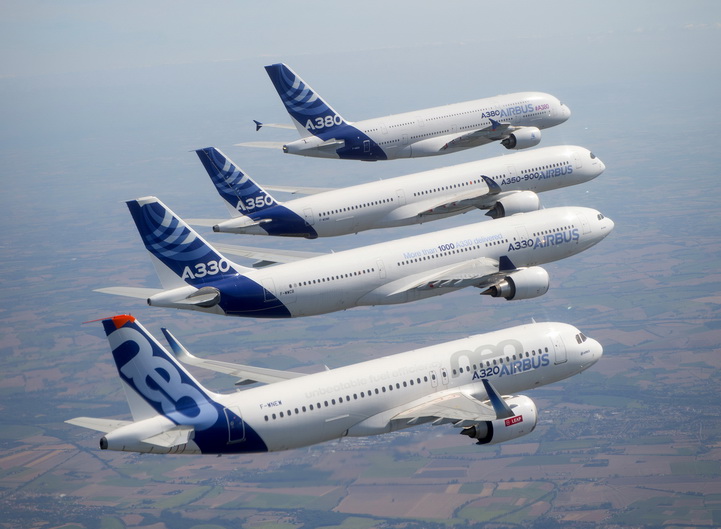Airbus has reported its nine-month 2018 consolidated financial results and provided updated full-year guidance.
“The nine-month results mainly reflect the good performance on the A350 and the aircraft delivery profile. Even though we delivered more aircraft than a year earlier, we still have a lot to do to meet our commitments,” said Airbus Chief Executive Officer Tom Enders. “On the A400M, we are progressing with the military capabilities, deliveries and retrofit. The contract amendment discussions are advancing, but a bit slower than planned. Our primary operational focus remains on commercial aircraft deliveries and securing the A320neo ramp-up.”
As of 1 July 2018, the A220 aircraft programme has been consolidated into Airbus.
Net commercial aircraft orders totalled 256 (9m 2017: 271 aircraft) with gross orders of 311 aircraft including 58 A350 XWBs. Industry fundamentals remain solid with the Airbus order backlog totalling 7,383 commercial aircraft as of 30 September 2018(3). Net helicopter orders increased to 230 units (9m 2017: 210 units), including 6 Super Puma Family and 36 H145s in the third quarter alone. Airbus Defence and Space’s 9m 2018 order intake of around € 5.0 billion included the contract for Heron TP drones from Germany.
Consolidated revenues increased to €40.4 billion (9m 2017: €38.0 billion), mainly driven by Airbus and including the perimeter changes. At Airbus, a total of 503 commercial aircraft were delivered (9m 2017: 454 aircraft), comprising 8 A220s, 395 A320 Family, 31 A330s, 61 A350 XWBs and 8 A380s. Airbus Helicopters delivered 218 units (9m 2017: 266 units) with revenues stable on a comparable basis. On a reported basis, Helicopters’ revenues reflected the perimeter change from the sale of Vector Aerospace in late 2017. Revenues at Airbus Defence and Space reflected a stable core business and the perimeter change mainly related to the divestment of Defence Electronics in February 2017 and Airbus DS Communications in March 2018.
Consolidated EBIT Adjusted – an alternative performance measure and key indicator capturing the underlying business margin by excluding material charges or profits caused by movements in provisions related to programmes, restructuring or foreign exchange impacts as well as capital gains/losses from the disposal and acquisition of businesses – totalled €2,738 million (9m 2017: €1,208 million).
Airbus’ EBIT Adjusted of €2,340 million (9m 2017: € 806 million) was driven by the A350 performance and higher deliveries, particularly for the A320neo.
On the A320neo programme, a total of 222 aircraft were delivered compared to 90 in the first nine months of 2017. On the A330neo programme, the A330-900 received Type Certification from the European Aviation Safety Agency in September with the first delivery expected shortly. Meanwhile, the A350 programme targeted monthly production rate of 10 aircraft expected by the end of 2018. Airbus states that good progress continues to be made on A350 programme recurring cost with the A350-1000 benefitting from the A350-900 learning curve.
Airbus Helicopters’ EBIT Adjusted increased to €202 million (9m 2017: €161 million), reflecting solid underlying programme execution which compensated for the lower deliveries.
Airbus Defence and Space’s EBIT Adjusted totalled 409 million (9m 2017: €397 million), reflecting the stable core business and solid programme execution. On a comparable basis, the Division’s EBIT Adjusted was broadly stable.
Consolidated self-financed R&D expenses totalled €2,103 million (9m 2017: €1,918 million).
With regard to full-year deliveries, the A320neo ramp-up is ongoing but the level of disruption resulting from the late availability of engines in the first half of 2018 as well as some internal industrial challenges make the full-year 2018 target a greater stretch. “A lot remains to be done before the end of the year to fulfill commitments,” says Airbus. “The A330neo delivery schedule has been adjusted to reflect the engine partner’s latest 2018 outlook. Furthermore, Airbus is actively working to resolve certain commercial challenges on the A330ceo and A380 programmes that are targeted for completion by the year-end.”
As the basis for its 2018 guidance, Airbus expects the world economy and air traffic to grow in line with prevailing independent forecasts, which assume no major disruptions.

